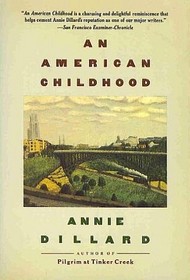Helpful Score: 4
Of Annie Dillard's books, I read An American Childhood first, and that was fortuitous, because later, when I read Pilgrim at Tinker Creek, I felt like I had known Annie as a girl and was meeting her again. Annie Dillard the woman is a close, respectful and articulate observer of the world around her at her home on Tinker Creek, Virginia. Reading pilgrim Annie's book is an esthetic pleasure and a therapeutic one, too. There are many readers like the woman I met once at a baccalaureate at which the speaker had taken his 'text' from Dillard. The woman said......"It's time for me to read Annie Dillard again." I understand that perfectly.
Helpful Score: 2
A wonderful book. Highly recommend it.
Helpful Score: 2
Annie was my creative writing teacher in college and my mentor. I've read all of her books and this one ranks right at the top. Her observant way of capturing ordinary events in imaginative prose brings an 'aha' moment to lots of pages. In this book, I remember reading about her lying in bed and watching a 'ghost of light' sweep around the wall of her room. Only much later did she realize that it was the headlight of a car turning a corner. So much to love about Annie and the way she chronicles our days on this planet. Read her work. You'll be glad you did!
From Publishers Weekly
Dillard's luminous prose painlessly captures the pain of growing up in this wonderful evocation of childhood. Her memoir is partly a hymn to Pittsburgh, where orange streetcars ran on Penn Avenue in 1953 when she was eight, and where the Pirates were always in the cellar. Dillard's mother, an unstoppable force, had energies too vast for the bridge games and household chores that stymied her. Her father made low-budget horror movies, loved Dixieland jazz, told endless jokes and sight-gags and took lonesome river trips down to New Orleans to get away. From this slightly odd couple, Dillard (Teaching a Stone to Talk acquired her love of nature and taut sensitivity. The events of childhood often loom larger than life; the magic of Dillard's writing is that she sets down typical childhood happenings with their original immediacy and force.
Dillard's luminous prose painlessly captures the pain of growing up in this wonderful evocation of childhood. Her memoir is partly a hymn to Pittsburgh, where orange streetcars ran on Penn Avenue in 1953 when she was eight, and where the Pirates were always in the cellar. Dillard's mother, an unstoppable force, had energies too vast for the bridge games and household chores that stymied her. Her father made low-budget horror movies, loved Dixieland jazz, told endless jokes and sight-gags and took lonesome river trips down to New Orleans to get away. From this slightly odd couple, Dillard (Teaching a Stone to Talk acquired her love of nature and taut sensitivity. The events of childhood often loom larger than life; the magic of Dillard's writing is that she sets down typical childhood happenings with their original immediacy and force.
i had to read this book for my English class and absolutely hated it. there was no plot and i had to force myself to read it. if it isn't required, DON'T read this book!!!!!
The book I have has a different cover. Interesting bio.
bought for a class but then didn't read




